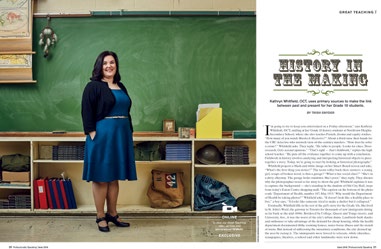Share this page
Professionally Speaking welcomes letters and articles on topics of interest to teachers. We reserve the right to edit letters for length and to conform to our publication style. To be considered for publication, letters must provide the writer’s daytime phone number and registration number. Address letters to: The Editor, Professionally Speaking at ps@oct.ca or 101 Bloor St. W., Toronto, ON M5S 0A1.

I read with interest in the June issue about the history teacher profiled in Great Teaching who uses primary sources to engage her students in real-life historical research. While I applaud the exemplary work of this teacher, I found some of the messages in this profile somewhat misleading.
The article seems to suggest that using textbooks in the classroom does not provide authentic learning experiences for students and that inquiry-based learning, conducting fieldwork and engaging in rich summative tasks are not part of the textbook experience. Nothing could be further from the reality of today’s textbooks. As the agency that evaluates textbooks for the province of Ontario, we examine all the textbooks that are available for use in Ontario schools. These resources have kept pace with changes in pedagogy and offer students many opportunities to engage in inquiry and to do meaningful work that has relevance beyond simply completing classroom assignments.
History and social studies textbooks, for example, include a variety of primary sources that provide opportunities for students to ask questions, analyze data and apply historical thinking concepts. They also suggest summative tasks that provide choice for students in how they demonstrate their learning and that take students into their communities to gather data, problem solve, or engage in active citizenship.
The article also seems to suggest that exemplary teachers do not “lean” on textbooks. This is a disheartening message for teachers who are not specialists in the courses or subjects they teach and who can offer a richer program for students supported by a well-researched, well-designed textbook.
I applaud Ms. Whitfield’s success, however, I hope we can identify these types of exemplary practitioners without undermining the evolution of textbooks or the many teachers who use them.
—Anita Sherwin-Hamer, OCT, is the evaluations director at Curriculum Services Canada in Toronto.
In “Keeping your Connection to the Profession” (September 2016), we published incorrect information about René Chiasson, OCT. Mr. Chiasson worked in various high schools in the Greater Ottawa area for 22 years as a French teacher. He then held positions as principal and vice-principal at the Conseil des écoles publiques de l’Est de l’Ontario and the Conseil des écoles catholiques du Centre-Est during the last 13 years of his career. He was vice-principal at the École des adultes Le Carrefour for two years and ended his career as principal of École secondaire publique L’Alternative in the Conseil des écoles publiques de l’Est de l’Ontario. We regret the errors.
In “Modernizing Teacher Education” (September 2016), the article erroneously stated that the Enhanced Teacher Education Program includes 80 hours of practice teaching, when, in fact, it includes 80 days. We regret the error.
After reading the Registrar’s Report in the September issue, in which Michael Salvatori, OCT, says that we all remain teachers at heart regardless of the position we hold, it came as a shock to read Pop Quiz with Chris D’souza, who is described as a “former teacher” even though he still works in education. Does this not contradict Mr. Salvatori’s message? [This letter has been translated from French to English.]
Editor’s response: Mr. D’souza is identified in Pop Quiz as an equity consultant and “former in-class teacher,” since he no longer teaches in the classroom.
—Sylvie Lamarche Lacroix, OCT, is a Grade 4 teacher at École catholique Anicet-Morin in Timmins, Ont.